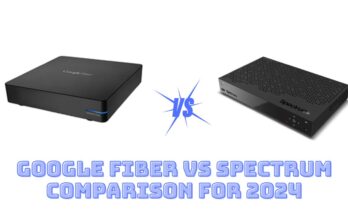As the world becomes increasingly digital, having a reliable internet connection is essential. Whether you are a student, professional, or just someone who enjoys streaming movies and TV shows in your leisure time, your internet service provider (ISP) can make or break your online experience. With so many options available, choosing the right ISP can be overwhelming. In this article, I will discuss seven key factors to consider when choosing an ISP.
Top 7 Factors for Choosing an Internet Service Provider
- Availability and Coverage
- Type of Connection
- Speed and Bandwidth
- Customer Support and Service
- Pricing and Contracts
- Additional Features and Benefits
- Comparison of Popular ISPs
1. Availability and Coverage
The first factor to consider when choosing an ISP is availability and coverage. Not all ISPs provide services in all areas, so it is important to first check if the ISP you are considering offers services in your area. You can check this on their website or by contacting their customer service. It is also important to check the coverage area, especially if you live in a remote area. Some providers offer services in only certain parts of a city or state, so it is important to make sure that you are covered.
If you are living in a densely populated area, you may have access to multiple ISPs. In such cases, it is important to compare the available options to get the best service that fits your needs. Look for providers that offer a wide coverage area and a reputation for reliable service.
2. Type of Connection
The next factor to consider is the type of connection offered by the ISP. There are several types of internet connections, including cable, DSL, fiber optic, and satellite. Cable internet is provided through the same coaxial cables that provide television service, while DSL internet uses telephone lines. Fiber optic internet uses fiber optic cables to transmit data, and satellite internet provides service through satellites in space.
Each type of connection has its own advantages and disadvantages. Cable internet is widely available, but the speed may be affected by the number of users in your area. DSL internet is reliable but may not offer high speeds. Fiber optic internet is the fastest and most reliable but may not be available in all areas. Satellite internet can be expensive and slow, with high latency.
3. Speed and Bandwidth
One of the most important factors to consider when choosing an ISP is the speed and bandwidth. The speed of your internet connection determines how fast you can browse the internet, download files, and stream videos. The bandwidth determines how much data you can use in a month.
When looking for an ISP, make sure to check the advertised speed and compare it to the actual speed. Some ISPs may advertise a high speed but not deliver on their promise. It is also important to consider the bandwidth offered by the ISP, especially if you are a heavy internet user. Some ISPs may offer unlimited bandwidth while others may have data caps.
4. Customer Support and Service
Another important factor to consider when choosing an ISP is customer support and service. Technical issues can arise at any time, so it is important to choose an ISP that offers reliable customer support. Look for providers that offer 24/7 customer service and multiple ways to get in touch, such as phone, email, and live chat.
It is also important to consider the quality of customer service. Look for providers that have a good reputation for resolving issues quickly and efficiently. You can read online reviews or ask for recommendations from friends and family.
5. Pricing and Contracts
The cost of the service is another important factor to consider when choosing an ISP. Look for providers that offer competitive pricing and value for money. However, it is important to also consider the contract terms and any hidden fees. Some providers may offer a low introductory rate but increase the price after a few months.
Make sure to read the fine print and understand the contract terms before signing up for a service. Look for providers that offer flexible contract terms or a no-contract option. This will give you the freedom to switch providers if you are not satisfied with the service.
6. Additional Features and Benefits
Some ISPs may offer additional features and benefits that can enhance your online experience. Look for providers that offer free equipment, such as modems and routers. Some providers may also offer free antivirus software or parental controls.
It is also important to consider the availability of Wi-Fi hotspots. Some ISPs may offer free Wi-Fi hotspots in public places, which can be convenient if you are on the go. Some providers may also offer discounts or promotions for bundled services, such as Internet and cable TV.
7. Comparison of Popular ISPs
To help you make an informed decision, here is a comparison of some of the most popular ISPs in the US:
- Comcast Xfinity: Offers cable and fiber optic internet with speeds up to 2Gbps. Prices start at $29.99 per month with a one-year contract.
- AT&T: Offers DSL, fiber optic, and satellite internet with speeds up to 1Gbps. Prices start at $35 per month with a one-year contract.
- Verizon Fios: Offers fiber optic internet with speeds up to 940Mbps. Prices start at $39.99 per month with a one-year contract.
- Spectrum: Offers cable internet with speeds up to 940Mbps. Prices start at $44.99 per month with a one-year contract.
- Google Fiber: Offers fiber optic internet with speeds up to 1Gbps. Prices start at $70 per month with no contract.
Conclusion
Choosing the right ISP can make a big difference in your online experience. When choosing an internet services provider, consider factors such as availability and coverage, type of connection, speed, and bandwidth, customer support and service, pricing, and contracts, and additional features and benefits. By taking these factors into account, you can find a provider that offers reliable service at a competitive price.
FAQ’S
A. When choosing an internet service provider, there are several factors to consider, including speed, reliability, data caps, pricing, contract terms, customer service, and available plans.
A. The speed of an internet service provider can be determined by checking the download and upload speeds offered by the provider. These speeds are usually measured in megabits per second (Mbps), and a higher number indicates a faster connection.
A. Data caps are limits on the amount of data that can be used in a given period of time, such as a month. If you exceed your data cap, your internet speed may be slowed down or you may be charged extra fees. It’s important to choose an internet service provider with a data cap that meets your needs.
A. To compare pricing between internet service providers, you can look at the cost per month, any additional fees or charges, and the total cost over the length of the contract.
A. When choosing an internet service provider, you should look for contract terms that are favorable to you. This may include no contract or a short-term contract, as well as the ability to cancel or change plans without penalty.
A. Customer service is an important factor to consider when choosing an internet service provider, as you may need to contact the provider for technical support or other issues. Look for a provider with good customer service reviews and multiple contact methods, such as phone, email, and online chat.
A. Internet service providers offer several types of plans, including DSL, cable, fiber optic, and satellite. Each type of plan has different advantages and disadvantages, so it’s important to choose the one that best meets your needs.



